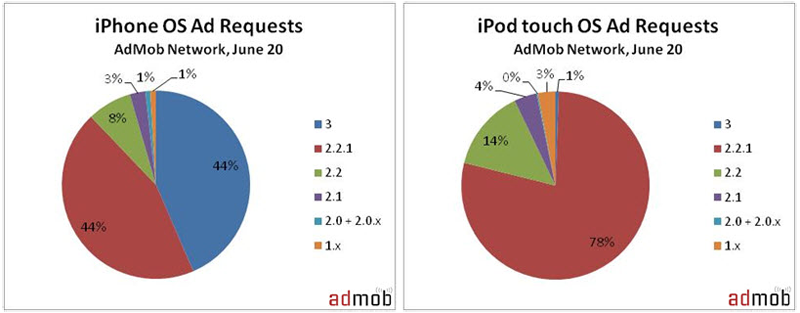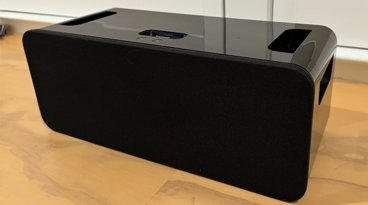Upgrade fee sees few iPod touch users updating to 3.0 software
On Monday, Apple announced that 6 million customers have downloaded iPhone Software 3.0 since its release last week. That means that roughly 15% of the 40 million multi-touch devices sold thus far by the Cupertino-based company are now running the latest software.
However, AdMob, whose ad network has been adopted by a large number of iPhone developers looking to monetize their free apps, recently released a few interesting statistics. Since it's able to see the version of iPhone Software running on iPhones and iPod touches making each ad request, it can quantify to some extent what percentage of those devices are running the various iPhone software distributions to date.
For example, the firm noted in a report a few days ago that it's seen "rapid adoption" of the 3.0 software by iPhones accessing its network. Though there's some margin of error given that not all iPhone users are launching applications with ties to its network, 44 percent of those that are were already running iPhone Software 3.0 by Saturday.
The statistics for iPod touch users paint an entirely different picture, however. AdMob reported that just 1% of iPod touch users accessing its network on Saturday had upgraded to the new software, while a resounding 78% were still running the latest point release of iPhone Software 2.0 introduced last year.
"The additional $10 fee to upgrade is clearly limiting uptake," the firm said, noting that this threatens to put a kink in Apple's App Store ecosystem. "Developers looking to sell applications utilizing the 3.0 features can’t be happy with Apple’s decision to charge for the upgrade as it limits their available market size for downloads."
Should adoption of iPhone Software 3.0 not pick up in the coming weeks and months, it will be interesting to see whether Apple makes a change to the way it positions and markets the iPod touch when new models hit the market early this fall. That's likely the first time to company would be in a position to offer iPod touches that could receive free software updates like the iPhone over their two-year life expectancy.
The reason iPhone (and Apple TV) customers receive free software updates stems from an announcement Apple made in April 27, 2007, shortly before the original iPhone hit the market. In an effort to make the handset more enticing and somewhat "future proof," the company said it would leverage its proven capability in the area of software development to gradually add new software features and applications to its iPhone (and Apple TV products) free of charge, thereby providing its customers with the "greatest possible experience."
Under GAAP accounting principles, Apple normally fully recognizes the revenue associated with the sale of a product, such as an iPod, once the device has reached the end user; or less commonly, when the device has shipped. Yet, due to certain idiosyncrasies with Sarbanes-Oxley (SarbOx), Apple, in order to account for the new features it delivers, claims it's forced to use what is called the subscription method of accounting for recognizing revenue from products it plans to improve over time.Â
Under this accounting method, Apple literally divides each iPhone sale by 730 — or the number of days in two years, representing the economic life of the product — and recognizes the portions from that particular iPhone sale each day for exactly two years or 730 days. Therefore, should Apple be compelled to treat iPod touches like iPhones and Apple TVs, it may need to make a similar disclosure to the one it made for the aforementioned two products back in 2007.
Such an announcement would be unlikely mid-product cycle and would be better made alongside new models.
 Sam Oliver
Sam Oliver














 Amber Neely
Amber Neely
 Thomas Sibilly
Thomas Sibilly
 AppleInsider Staff
AppleInsider Staff
 William Gallagher
William Gallagher
 Malcolm Owen
Malcolm Owen
 Christine McKee
Christine McKee









136 Comments
Wait, why the heck have only half the iPhone users upgraded??? It's free and it makes your iPhone do everything noticeably faster - not to mention all the added features.
So users will pay $10 for an app but not to update their device. Makes no sense.
Yet, due to certain idiosyncrasies with Sarbanes-Oxley (SarbOx), Apple, in order to account for the new features it delivers, claims it's forced to use what is called the subscription method of accounting for recognizing revenue from products it plans to improve over time.*
Do they do the same accounting for the computer line like the iPhones? I never understood Apple's or SarbOx's stance on this because it seems contradicting.
Do they do the same accounting for the computer line like the iPhones? I never understood Apple's or SarbOx's stance on this because it seems contradicting.
This whole matter is very much an open debate, regarding whether Apple really needs to take the subscription accounting route. But no, Mac revenues are not amortized and are recorded in full when they ship.
K
At the heart of it there's something wrong with having to pay for Touch upgrades. I mean even if you have to pay for it Apple could charge .99 cents and be done with it. It just smacks too much as a money grab conveniently disguised as a "Oh it's the government." This is the Apple tax.